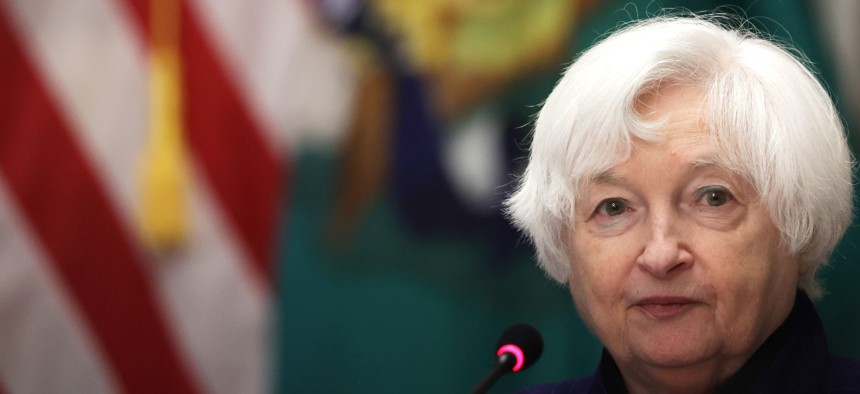
Treasury Secretary Janet Yellen warned Congress to act as quickly as possible to increase the debt limit. Alex Wong / Getty Images
Debt Ceiling Breach Could Occur as Soon as June 1, Treasury Warns
While they had hoped for more time, lawmakers have just a few weeks to avoid a catastrophic default.
This article was updated at 9:30 a.m. on May 2 to include details on the White House reaching out to congressional leaders for a meeting.
The U.S. government could default on its debts as soon as June 1, according to a new estimate from the Treasury Department, giving lawmakers and the White House just a few weeks to break an impasse that has so far prevented an increase to the national borrowing limit.
Such a breach would be unprecedented and have catastrophic impacts on the federal government's operations and the U.S. economy. Economists had hoped the government’s “extraordinary measures” would buy enough time to allow Treasury to pay the nation’s debts through late summer, but Treasury Secretary Janet Yellen told Congress on Monday the deadline would come much sooner.
“After reviewing recent federal tax receipts, our best estimate is that we will be unable to continue to satisfy all of the government’s obligations by early June, and potentially as early as June 1, if Congress does not raise or suspend the debt limit before that time,” Yellen said in a letter to congressional leadership.
The secretary earlier this year similarly predicted an early June deadline, but economists had subsequently anticipated Congress might have more time.
House Republicans have demanded any debt ceiling increase be paired with dramatic cuts to spending at non-defense federal agencies and passed a bill to that effect last week. To date, President Biden and congressional Democrats have refused to negotiate and demanded a “clean” debt limit increase without conditions. The Senate is not expected to take up the House’s bill, and the White House has said Biden would veto it.
The two sides remain at a standstill and have not met since Feb. 1, with the White House saying it would only negotiate over spending levels if those conversations were not tied to the debt ceiling. In announcing its veto threat, the White House said the bill was “a reckless attempt to extract extreme concessions” from the president and Biden would not “accept such attempts at hostage taking.”
The White House announced after Yellen’s letter, however, that Biden called House Speaker Kevin McCarthy, R-Calif., and the rest of congressional leadership to invite them to a meeting at the White House on May 9.
Yellen stressed her projection could change and the actual date of a default could be “a number of weeks later than these estimates.”
“It is impossible to predict with certainty the exact date when Treasury will be unable to pay the government’s bills, and I will continue to update Congress in the coming weeks as more information becomes available,” Yellen said. “Given the current projections, it is imperative that Congress act as soon as possible to increase or suspend the debt limit in a way that provides longer-term certainty that the government will continue to make its payments.”
While economists and lawmakers have speculated about a range of outcomes if an unprecedented default were to occur, most have agreed the most likely scenario would require the Treasury Department to delay all government payments until it had enough money available to meet the demands of a given day. That would require federal employees to either face furloughs or work with only the promise of back pay once the situation was resolved. Agency payments to beneficiaries, states, grantees, contractors and, potentially, their own employees, would be disrupted.







